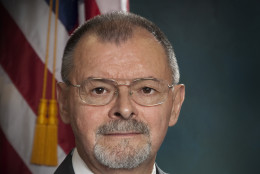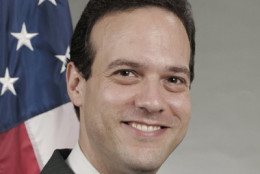Defense Department
-
Frank Kendall, DoD’s undersecretary for acquisition, technology and logistics, clarifies new rules about public funding as the Pentagon begins investing in Silicon Valley.
September 02, 2015 -
Susan Kelly introduced sweeping changes to the Defense Department's Transition Assistance Program, improving the transition of service members to civilian life.
September 02, 2015 Bill Corrington, federal director for the Cloud Security Alliance and Juanita Koilpillai, founder and CEO of Waverly Labs, join host John Gilroy to explain why Software Defined Perimeters is a new paradigm in computer security. September 1, 2015
August 31, 2015-
As part of the Pentagon’s effort to build cozier relationships with Silicon Valley, the Pentagon says it will become the largest investor in a new research symposium that hopes to create a new generation of electronic components. Federal News Radio’s Jared Serbu has more on DoD’s investment plan and what it hopes to achieve.
August 28, 2015 -
Saturday marks the ten-year anniversary of the day Hurricane Katrina made landfall in southern Louisiana. The Pentagon says in the decade since then, it’s made several changes that are intended to get Defense Department resources to local disaster zones within hours instead of days. More from Federal News Radio’s DoD reporter, Jared Serbu.
August 27, 2015 -
The Department of Defense has been working on guidelines to help its contracting officers decide whether potential noncompetitive contracts are worth their advertised prices. The new guidelines address different ways agencies can tackle situations where they don't have information available to them.
August 26, 2015 -
The Defense Department asks Congress for permission to reprogram more than 100 million dollars to contribute to the governmentwide collection to pay for data breach services. DoD is by far the largest agency sending money to the Office of Personnel Management. Federal News Radio Executive Editor Jason Miller is here to tell us about DoD’s request and what other agencies should take from it.
August 25, 2015 -
The Defense Department is working on new training and guidance to help its contracting officers decide whether potential contracts are worth the price. The Government Accountability Office sampled 32 commercial contracts. DOD contracting officials asked for cost, pricing and other information to help them determine if contracts were reasonably priced for 12 of them. Bill Woods is director of acquisition and sourcing management issues at GAO. He said it's too early to say whether the Pentagon's training and guidance is working, but he tells In Depth with Francis Rose that contracting officers DO have some challenges.
August 24, 2015 -
As the Army prepares to graduate the first two female Rangers in its history in a ceremony tomorrow, officials are insisting they did not alter their training standards to accommodate the Army’s first round of female students. But it’s still unclear whether those two new Rangers will ever be allowed to serve in direct ground combat. More from Federal News Radio DoD Reporter Jared Serbu.
August 20, 2015 -
The Navy’s top officer says the Pentagon is fighting a congressional proposal that would dramatically reduce take-home pay for tens of thousands of servicemembers by reducing their housing allowances. The details from Federal News Radio DoD Reporter Jared Serbu.
August 19, 2015 -
The General Services Administration's Western Regions Conference scandal still leaves a bad taste in the mouths of some agencies. Spending on government conferences dropped $3 billion between 2013 and 2010. And the Office of Management and Budget told agencies to cut travel spending by 30 percent back in 2012. But federal employees gain some benefits from conferences that money can't buy. Bob Hale is a fellow at Booz Allen Hamilton, former undersecretary of defense comptroller and former executive director of the American Society of Military Comptrollers. He tells In Depth with Francis Rose why conferences are still valuable.
August 19, 2015 -
The Defense and Veterans Affairs departments are a long way from deploying new electronic health record systems that can communicate with each other. Both agencies didn't meet a deadline last year to make sure their data complies with national standards. Valerie Melvin is director of information management and technology resources issues at GAO. She tells In Depth with Francis Rose why defined goals would help both departments better measure their progress.
August 18, 2015 The Department of Defense launched its revamped anti -improvised explosive device agency with a new name and broader mission capacity. JIDA monitors new trends in IED development, weapons, tactics and techniques used by enemy combatants and stops them before they can do damage.
August 17, 2015-
The aircraft carrier Gerald R Ford will be the first ship of the Navy's new carrier design. The Defense Department will use the Ford for shock tests instead of waiting for the second ship in the series — the John F. Kennedy — to be complete in about five years. Bryan Clark is senior fellow at the Center for Strategic and Budgetary Assessments and former Special Assistant to the Chief of Naval Operations. He tells In Depth with Francis Rose what the Pentagon's decision means for the ship and for the whole carrier fleet.
August 12, 2015 -
President Obama wants to build one of the fastest supercomputers ever in the next 15 years. The exascale computer would run about 30 times faster than today's fastest supercomputer. It's part of the National Strategic Computing Initiative in collaboration with the Energy Department, Pentagon, and National Science Foundation. Simon Szykman is the chief technology officer for Attain's federal services division and former chief information officer at the Commerce Department. He tells In Depth with Francis Rose that the project might not live up to all the hype.
August 04, 2015









